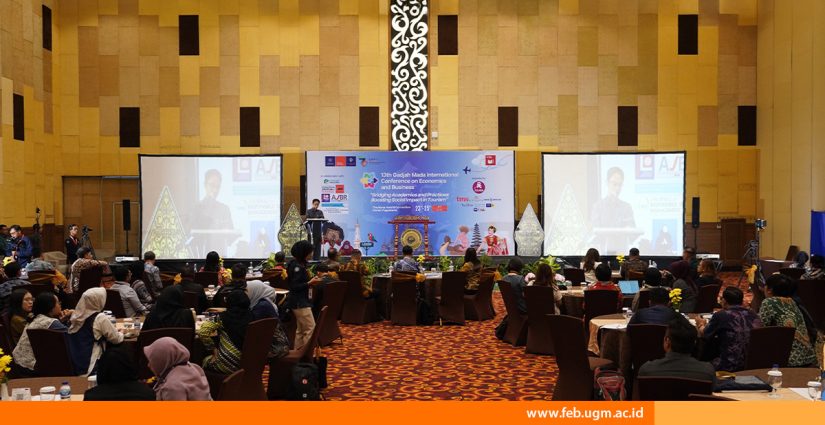
Hundreds of researchers and experts from various countries discussed strategic issues related to developing a sustainable, inclusive, and community-empowering tourism sector at the 13th Gadjah Mada International Conference on Economics and Business (GAMAICEB). The conference was organized by the Publication Unit of the Faculty of Economics and Business, UGM, on July 23-24, 2025, at The Alana Hotel and Convention Center, Sleman, Special Region of Yogyakarta.
The conference, themed “Bridging Academics and Practices: Boosting Social Impact in Tourism,” was attended by 125 participants from five countries: Indonesia, Japan, Malaysia, Mexico, and Vietnam. Of the total participants, 110 will present their latest research findings during parallel presentation sessions addressing current issues in accounting, economics, management, entrepreneurship, investment, and marketing, focusing on strengthening the tourism sector.
In his speech, Gumilang Aryo Sahadewo, Ph.D. Deputy Dean for Research, Community Service, Cooperation, and Alumni, FEB UGM, said that tourism is one of the global economy’s most resilient and transformative sectors. Globally, tourism contributes more than 10% of the world’s GDP and employs hundreds of millions.
“For Indonesia, tourism is more than just economic figures, but reflects cultural heritage, natural beauty, and sustainable development potential,” he explained on Wednesday (23/7) at The Alana Hotel and Convention Center.
Gumilang said that with destinations ranging from Borobudur to Raja Ampat, Indonesia welcomed more than 16 million international tourists before the pandemic, contributing significantly to the national economy. However, the tourism landscape has undergone fundamental changes. Today’s travelers seek meaningful experiences with a positive social impact, environmental sustainability, and authentic cultural exchange. This transformation requires academics and practitioners to bridge the gap between theoretical knowledge and practical implementation.
Gumilang further noted that research in tourism economics, sustainable hospitality management, community-based tourism, and digital transformation is becoming increasingly important. Therefore, future research must address pressing questions such as how tourism can drive inclusive economic growth, balance economic benefits with environmental conservation, and the role of technology in creating fair tourism opportunities.
These questions cannot be answered separately by practitioners alone or by academics. However, a collaborative approach is needed, such as this year’s conference theme, Bridging Academics and Practices: Boosting Social Impact in Tourism. This theme is very relevant in this context. True collaboration between academia and industry requires trust built on integrity.
“When our research is strong, partnerships with the industry become more meaningful, our policy recommendations carry greater weight, and the social impact we generate becomes broader,” he said.
Meanwhile, GAMAICEB Chair Arika Artiningsih, Ph.D., noted that this forum brings together academics, practitioners, policymakers, and students to engage in meaningful discussions and collaborative thinking about enhancing tourism’s social impact. Through this forum, cross-disciplinary dialogue will be sparked and long-term partnerships between academia and the real world will be built. Furthermore, this conference can catalyze a tangible impact.
This conference featured several important figures, including Assistant Deputy for Human Resource Capacity Building and Vocational Education, Dr. Andar Danova L. Goeltom, M.Sc, CPM (Asia), CHE., President Director of Taman Mini Indonesia Indah, Intan Ayu Kartika; and Director of Responsible Borneo-REBORN, Prof. Hiram Ting, as keynote speakers. Bogat Agus Riyono, who represented the sponsor and a tourism practitioner, also delivered the opening remarks.
Vice Rector for Research, Business Development, and Cooperation at UGM, Dr. Danang Sri Hadmoko, S.Si, M.Si, officially opened the forum. He hoped this conference would serve as a platform for converging innovation and tangible action. Academics and practitioners are encouraged to collaborate to address the real challenges faced by society.
Report by: Kurnia Ekaptiningrum
Sustainable Development Goals (SDGs)










